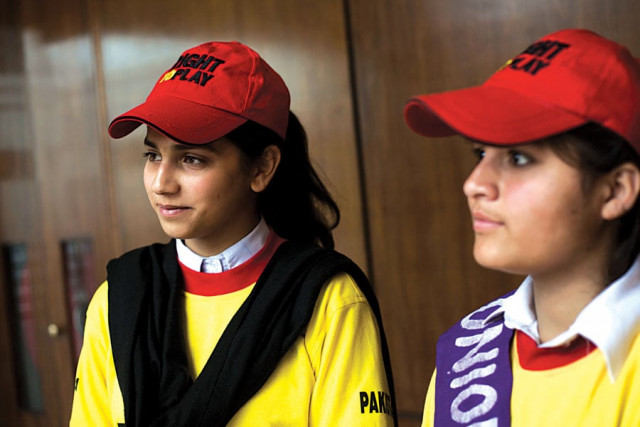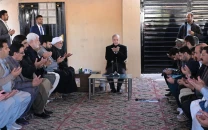Transformative activity: Sports, a means to peace and development
Empowerment of girls through team activities emphasised.

Kainat and Mahnoor listen to another participant during the event. PHOTO: EXPRESS
With her ponytail tucked neatly beneath her baseball cap, the middle-school student from Mansehra had accessorised her uniform with a sash flaunting the title “sports leader”. With her speech well-rehearsed, she spoke about sports as a tool to develop improved social skills in conservative societies.
Crediting her passion for volleyball and table tennis, she said that her active engagement in sports had taught her the discipline to address large gatherings and host events.
The intentional use of sport, physical activity and play to harness values such as peace and development is a relatively new concept for many, especially in societies closed-off to the idea of change.
However, learning these skills at school and practising them at home, children are benefiting from sports. Mishaal Khalid, 15, from Mardan, said girls her age were not allowed to play in streets, but participating in school events helped her and her peers hone their abilities and gain confidence in them.
Recognising play as the birthright of every child, the UN General Assembly in 2013 proclaimed April 6 as the International Day of Sport for Development and Peace. Far from being a hobby, play can contribute to the holistic development of children when properly utilised. The definition of play, however, is both wide-ranging and elusive.
While many types of play exist, ranging from structured to unstructured, physically strenuous to less active, and social to individual, the ability of play to act as a bridging language cross-cutting cultural and linguistic barriers is universal across all types. Sports and play have innately inclusive and interactive qualities that, when tapped into effectively, have the power to transform lives and have a positive impact.
“The power of sport is limitless,” said UN Secretary General’s Special Advisor on Sport for Development and Peace Wilfried Lemke, in a press statement.
The Right To Play initiative is reaching out to one million children in regular weekly activities, 49% of which are female. Spreading their network across more than 20 countries, the organisation has been working in 16 districts in Pakistan since 2008 and engaging 169,000 children, with more than 50% of the participants being girls.
In his press statement, Right To Play CEO Johann Olav Koss said children are the change makers of the world, as all it takes is one child to positively influence their community. “Together we are creating a domino effect for positive and lasting change,” he added.
Published in The Express Tribune, April 7th, 2014.



















COMMENTS
Comments are moderated and generally will be posted if they are on-topic and not abusive.
For more information, please see our Comments FAQ